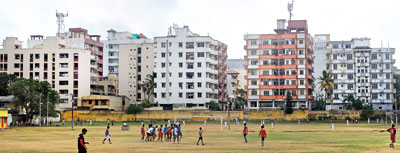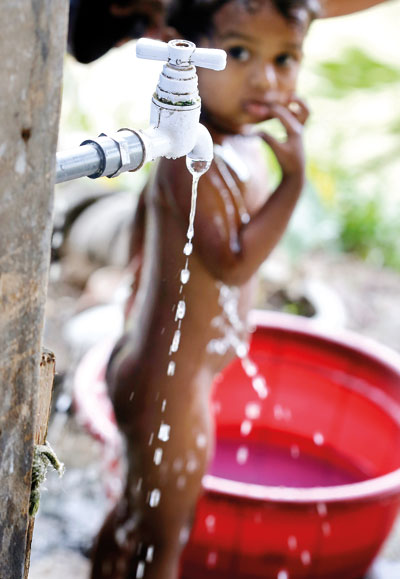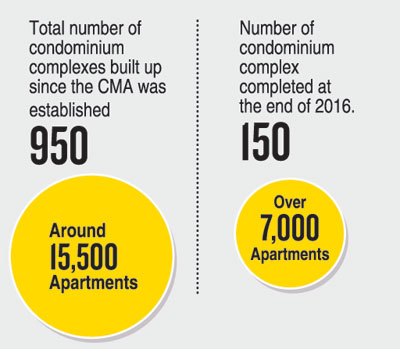News
Monster water tanks for the few choke off supply for the many

Water guzzlers: Apartment tanks add to Colombo's water pressure problem. Pix by M.A. Pushpa Kumara and Amila Gamage
With more than 7,000 apartments set to be completed in the country, most of them in Colombo city and its suburbs, the National Water Supply and Drainage Board (NWSDB) is hard-pressed to keep providing supply.
Most of the 7,000 apartments, located in 150 buildings, have large underground tanks to store water, placing an extra burden on the water board.
The number of apartments due for completion this year has soared from a total constructed over the past 11 years of 15,500 apartments in 950 complexes.
NWSDB Chairman Engineer K.A. Ansar said every day the board received 80-90 complaints about water pressure and faced difficulties in providing water to heavily-populated residential areas because apartment blocks collected the water in huge tanks, causing a drop in pressure for the surrounding area.
Most complaints came from Wellawatte, Bamabalapitiya, Maligawatte, Hulftsdrop and Battaramulla.
Mr. Ansar said the water board could only supply 750,000 cubic meters (750,000,000 litres) of water a day for Colombo but needed an additional 30,000 cubic meters (30,000,000 litres) to meet rising demand.

Not enough pressure: The Water Board says it receives daily around 90 complaints regarding low water pressure
“The apartment tanks are adding to the water pressure problem. The Water Board has no legal limits on how much water storage people can have so apartment builders keep on constructing huge tanks,” he said.
The NWSDB plans to set up a new water plant at Kelaniya to help meet demand but adding this water to the main line is difficult because the British-built waterpipes in Colombo are more than 100 years old, he said.
Mr. Ansar said the underground tanks built for hostels and apartment blocks should only be large enough to hold water for one day’s use.
“A family of four requires 1000 litres a day,” he said.
Bambalapitiya resident Bodinagodage Srimathee, whose home lies opposite a nine-floor apartment complex, said water pressure to her house had dropped, mostly during the day, after the apartment complex had been built.
She said the 15 families residing in the apartments experienced no hardship because the block had an underground tank.
“The apartment complex has an underground tank and pumps, its own sewage lines and drainage while we have much lower water supply,” she said.
Mr. W.A. Kamal, a father of three whose home lies behind an apartment complex near Peterson Lane in Wellawatte said his family had to resort to filling their overhead tank at night in order to collect water for daytime use. During the day, when the huge underground tank under the complex was being filled – a process that takes more than 12 hours – water supply to Mr. Kamal’s stops completely.
“My schoolchildren need water in the morning to bathe and get ready to go to school yet they have no water if I forget to fill the tank,” he said.
He drives a three-wheeler and explained he had to wash the vehicle, wash clothes and prepare food all at night because water was only available at that time.
Mr. Kamal said when he complained to the water board he was told the problem was being caused by the apartment building’s tank and that the board could not restrict water connections.
N. Gunasekara, who lives surrounded by three apartment complexes at Charlemont Road, Wellawatte, said he gets very low water pressure during the day.
He said the buildings drew water from big, six-inch pipes so his house received very little water.
Some apartment blocks have tanks large enough to store water sufficient for two to three weeks’ use. The Sunday Times was told of one block in Nugegoda that had six huge overhead tanks and an underground tank big enough to provide water for 21 days.
There are no restrictions on water storage imposed by the water board, Colombo Municipal Council or the Condominium Management Authority (CMA). Some tanks hold more than 50,000 litres.
CMA Chairman C.A. Wijeyweera said in addition to construction in Colombo, apartments blocks were coming up in Kalutara, Gampaha, Bandarawela, Kurunegala, Galle and Puttalam.
Mr. Wijeweera said as the regulatory authority it issued clearance to the developer who first had to acquire local authority and Urban Development Authority clearance as well as approval from the Ceylon Electricity Board, NWSDB, Civil Aviation Authority, Central Environmental Authority and, if relevant, the Coast Conservation Department.

